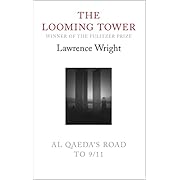
I've recently finished reading
Lawrence Wright's excellent "The Looming Tower"
. It is the result of years of reporting and hundreds of interviews all around the world. Wright, a investigative journalist from the New Yorkers, paints a vivid pictures of what can be called loosely "the Islamist world" pre-9/11; a world of radicals and reactionaries, conservatives and revolutionaries, those obsessed with politics and those who only are interested in religion. This diversity is something that many still now in the West do not understand, or will not acknowledge. They don't know about the vicious infighting and attacks on each others' characters that the two leaders of the Egyptian radical groups that were active during the Afghan Jihad carried out. Ayman al Zawahiri leading Egyptian Islamic Jihad and Sheik Omar Abdul Rahman of the Gamaa Islamyia clearly loathed each other despite their supposed common purpose (p.138). Few would be interested to know that Hasan al-Turabi, the famous 'radical' Sudanese Islamist thinker and leader was radical in part because of his views on the importance of the emancipation of women - that women should vote, lead prayers and even fight - from a Koranic perspective. Few will know how at the end of the 80s and start of the 90s, there were major division in the foreign Mujahideen in Pakistan and Afghanistan between the
Takfiri tendencies and the far more mainstream Muslim Brotherhood. The Muslim Brotherhood is an Islamist organisation, but they were loathed by the Takfiris for their moderation and interest in democratic politics. Wright paints a nuanced picture of Abdullah Azzam, now often fetishized in Jihadi circles as a great leader of the Afghan Mujahideen. Wright notes that this man famed now for having been involved in setting up Hamas and wanting to bring the Jihad to Palestine after the defeat of the Soviets, was also hated by the Takfiri crowd in Peshawar, including increasingly al Zawahiri, who saw him as too attractive to young volunteers coming to fight in Afghanistan. They saw him as collecting support for the Muslim Brotherhood and hence taking away influence from their more violent and radical aims. Azzam also came to support in the Afghan civil war, as the Soviets left, Ahmed Shah Massoud. Massoud was assassinated by al Qaeda just days before 9/11. Massoud resisted the Taliban in the late 1990s and because of this has been celebrated by some in the west, rather simplistically, as some kind of hero who withstood Islamic totalitarianism. But through the war with Russia and the civil war that followed, Massoud was a brutal warlord much like the others and just as interested in imposing his version of an Islamic state on Afghanistan. Azzam's support for Massoud was interesting as Massoud was a Tajik whilst his rival, Gulbuddin Hekmatyar, was a Pashtun and hence much closer to the Pakistanis with whom most the Arab volunteers were coordinating and it was his support for Massoud that most likely led to Azzam's assassination in 1989.
Its a great book, fascinating in it details yet still very readable. Journalism at its best.
 I've recently finished reading Lawrence Wright's excellent "The Looming Tower"
I've recently finished reading Lawrence Wright's excellent "The Looming Tower" I've recently finished reading Lawrence Wright's excellent "The Looming Tower"
I've recently finished reading Lawrence Wright's excellent "The Looming Tower"
1 comment:
Hi Toby,
Before I sound like a cynic, the book sounds interesting, and I'll admit to knowing less than Lawrence Wright about the different Islamist movement's leaders ect. that he writes about.
That said, there were also many who believed that they both "understood and knew" what Ho Che Mein, Fidel Castro, Pol Pot and the Ayatollah Khomenei stood for and what theyr were all about.
History has thoroughly shown the just mentioned to have been completely different than the image they projected to the outside world.
In spite of Hasan al-Turabi's supposed "feminisim", I'll wager his view of women fighters to be closer to that of Hamas' deceased "spiritual" leader Sheik Yassin's or Saddam Hussein's, with the latter being thoroughly debunked as some kind of an Islamic feminist.
Curiously even Ahmed Shah Massoud the "Tajik Lion" has been misunderstood by the west. Brutal is as brutal does in that neck of the world, I am wondering though if Wright takes the time to explain the differences between Massoud and the Taliban?
Post a Comment